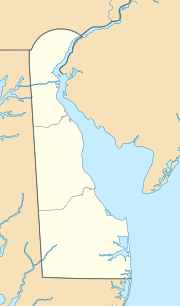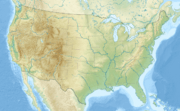Corks Point Ditch facts for kids
Quick facts for kids Corks Point Ditch |
|
|---|---|
| Other name(s) | Tributary to Smyrna River |
| Country | United States |
| State | Delaware |
| County | New Castle |
| Physical characteristics | |
| Main source | Sawmill Branch divide About 0.5 miles south of Tent, Delaware 52 ft (16 m) 39°20′59″N 075°36′11″W / 39.34972°N 75.60306°W |
| River mouth | Smyrna River about 2 miles east of Walker, Delaware 0 ft (0 m) 39°20′21″N 075°33′30″W / 39.33917°N 75.55833°W |
| Length | 3.86 mi (6.21 km) |
| Basin features | |
| Progression | south then northeast |
| River system | Smyrna River |
| Basin size | 7.29 square miles (18.9 km2) |
| Tributaries |
|
| Bridges | Paddock Road, McQuail Road |
Corks Point Ditch is a small stream, about 3.86 mi (6.21 km) long, located in New Castle County, Delaware. It is a "second-order tributary," which means it's a stream that flows into another stream, which then flows into an even larger river. In this case, Corks Point Ditch flows into the Smyrna River.
Other Names for the Ditch
Sometimes, streams and rivers have more than one name. According to the Geographic Names Information System, which keeps track of place names, Corks Point Ditch has also been known by these names in the past:
- Beaver Branch
- Morris Run
Where the Ditch Starts and Ends
Corks Point Ditch begins near a place called Tent in New Castle County, Delaware. It starts close to the area where the Sawmill Branch also begins. This starting point is about 0.25 miles south of Tent.
From its start, Corks Point Ditch first flows south. Then, it changes direction and flows northeast. Finally, it joins the Smyrna River about 2 miles east of a town called Walker, Delaware.
The Ditch's Watershed
A watershed is like a giant bowl of land where all the rain and snowmelt drain into a single stream, river, or lake. The watershed for Corks Point Ditch covers an area of 7.29 square miles (18.9 km2).
- Rainfall: This area gets about 44.4 inches of rain and other precipitation each year.
- Forests: About 13.0% of the land in this watershed is covered by forests. Forests are important because they help filter water and provide homes for wildlife.



